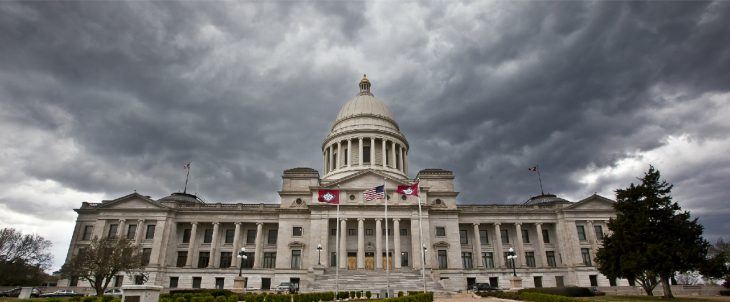Three-day special session to focus on health care
by April 25, 2017 7:12 pm 612 views

The state Legislature will meet May 1 to adjourn its regular biennial session and then enter into a three-day special session to pass health care legislation and make technical corrections on medical marijuana and ethics laws.
Gov. Asa Hutchinson’s spokesman, J.R. Davis, said the governor is expected to make the official call Wednesday or perhaps as late as Friday.
The primary focus will be to pass legislation enabling the state to change its Arkansas Works program to reflect waiver amendments it expects to receive from the Trump administration.
Arkansas Works, formerly known most commonly as the private option, is the state program that uses federal Medicaid dollars to purchase private health insurance for more than 300,000 Arkansans with incomes up to 138% of the federal poverty line.
The state is seeking waivers from the Trump administration that would reduce the eligible income level to 100% of the federal poverty line, a change that would reduce the number of recipients by about 60,000. Individuals with higher incomes would move to the federal marketplace and be eligible for federal subsidies. They would pay up to 2% of their income for their insurance, which they could lose if they don’t pay.
The second requested waiver would add a requirement for able-bodied recipients to work, be engaged in work training, or volunteer with a charitable organization. Under Arkansas Works’ current waiver granted by the Obama administration, recipients are referred to the Department of Workforce Services. However, few beneficiaries are taking advantage of that benefit.
The third waiver would replace Arkansas Works’ current employee-sponsored insurance component with a program targeting individuals working for small businesses and earning 75-100% of the federal poverty line. The state would provide funding for insurance premiums up to the amount it would have paid for an individual in Arkansas Works. Employees would receive the same benefits as coworkers but without additional “wraparound” benefits.
The final amendment would make Arkansas an “assessment state” rather than a “determination state,” meaning Arkansas rather than the federal government would determine eligibility.
Gov. Asa Hutchinson’s spokesman, J.R. Davis, said the governor is very confident the Trump administration will grant the waiver requests.
“We’ve had constant communication with (Department of Health and Human Services) Secretary (Tom) Price and Vice President Pence, and we’re very confident in what we submit to HHS will be approved,” he said.
The waiver legislation was not introduced during the Legislature’s regular session because the HHS requests and legislation weren’t ready and because policymakers were waiting to see what would happen with health care reform, said Speaker of the House Jeremy Gillam, R-Judsonia.
Gillam said he does not expect much controversy over the requests, but he can’t be certain.
“Any time you bring all 135 of us back together, there’s always a chance” for a problem, he said. “I foresee a fairly smooth special session, but I learned a long time ago, don’t predict those kind of things. But everybody knows what’s out there and what we’ve been talking about.”
Senate President Jonathan Dismang, R-Searcy, said, “We are in the process of getting the legislation to members for review and will start gauging support tomorrow (Wednesday). I expect the session to last the three day minimum.”
Dismang said lawmakers will also make changes to the Arkansas Health Insurance Marketplace (AHIM). He’s pushing for an increase in the legislative level of review of the AHIM by moving the oversight committee to the Arkansas Legislative Council (ALC) and allowing for the establishment of reporting requirements. Additionally, lawmakers will consider requiring ALC to review and make recommendations regarding the future of the organization.
Legislators also will make noncontroversial technical corrections to laws that amended the Arkansas Medical Marijuana Amendment. Lawmakers passed two dozen laws that will be combined and cleaned up through one piece of legislation. Because the laws change a constitutional amendment, they cannot be changed through the state’s usual code revision process.
The same process will occur with ethics-related legislation that must be made to conform with an earlier ethics amendment.
Could other legislation be added to the special session call? That’s the governor’s prerogative, but Dismang said he doesn’t expect additional measures.
“At this point, I expect that there will only be four issues addressed in the session,” Dismang said. “Several members have expressed the desire to have additional legislation added to the call, including changes to the laws governing executions. While each of these items have merit, I do not believe that this is the proper venue or time for their introduction.
“We just recently completed the work of a regular session, when each of these items could and should have been addressed. This issue is one that has obviously elevated emotions over the past couple of weeks. I have reservations about injecting that emotion into this session. Any changes in this area deserve thorough debate. With the session expected to start in five days, I personally don’t see how that is possible.”
